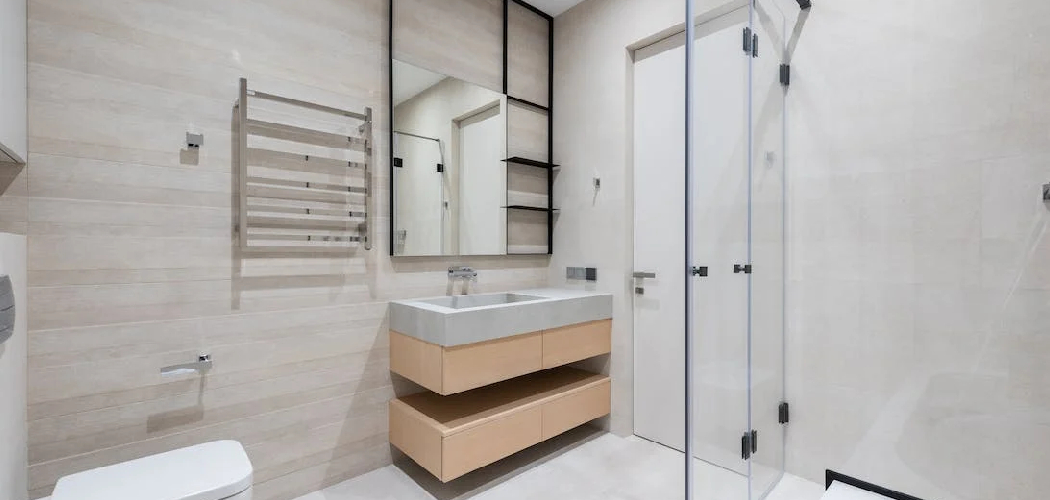Do you have to endure the sound of your neighbor’s kids while they are taking a bath or using their bathroom? Or maybe you don’t want your kids yelling at each other in the middle of seeing guests over? Do you want to improve the soundproofing in your bathroom so that noises don’t disturb other members of the household? You’re not alone. It’s a common issue, particularly if your home doesn’t have much natural insulation between rooms or walls.
Soundproofing your bathroom walls and ceiling can help reduce noise levels and make for a more pleasant environment.
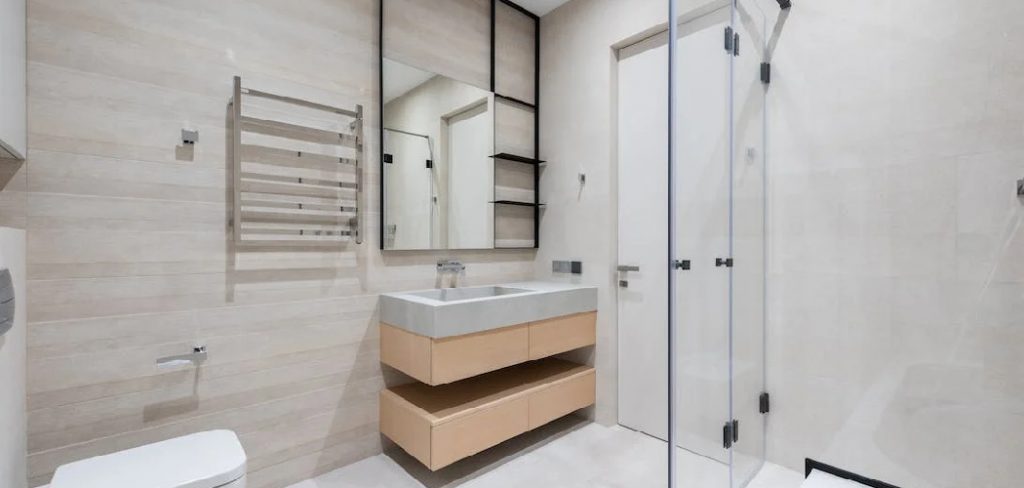
Fortunately, there are steps you can take to reduce outside noise and make your bathroom soundproof. These tactics range from basic DIY improvements to installing professional-grade acoustic materials — all of which will work together to give you a much quieter environment! Keep reading for our guide on how to make bathroom soundproof in simple and effective ways so that you never have to suffer through another loud argument or short-term concert any time.
Why Soundproofing the Bathroom is the Best Idea
Soundproofing is often a great idea for bathrooms, especially if your home has thin walls and poor insulation. Noise from running showers, flushing toilets, and other bathroom activities can easily travel through the walls to adjacent rooms or hallways. Soundproofing helps absorb sound waves and prevents them from echoing against the walls so they don’t escape to other areas of the house.
On top of that, soundproofing also helps create a feeling of privacy and tranquility in your bathroom by blocking out any sounds from outside sources (such as neighbors or traffic). This is especially important if you live in a busy area or near a noisy street.
The Benefits of Soundproofing the Bathroom
1. Increased Privacy
Soundproofing your bathroom can help ensure that the noises from within the bathroom are not heard by people outside. This makes for greater peace and privacy, especially if your family or neighbors hear every flush of the toilet or running shower.
2. Reduced Stress
When you soundproof your bathroom, you’ll be able to relax in peace and quiet without having to worry about any outside distractions. This can help reduce stress levels, especially when you need some alone time for showering or taking a hot bath.
3. Improved Acoustics
Soundproofing your bathroom walls will also help improve the acoustic quality of music playing inside the room. The sound waves won’t be able to escape, so the music will sound fuller and reverberate more clearly.
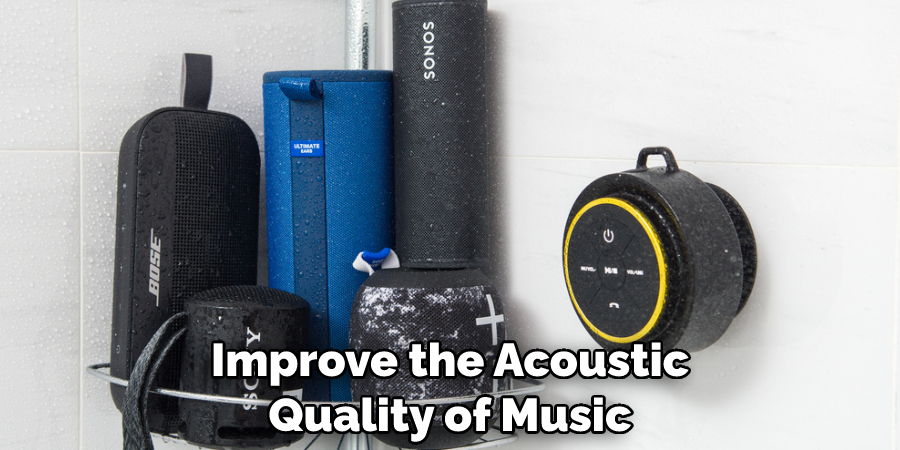
Needed Tools and Materials
There are several tools and materials you’ll need to make your bathroom soundproof. Here is a list of the most common items:
- Acoustic foam or fiberglass insulation
- Sound barrier or acoustic sealant
- Drywall or wallboard screws
- Caulk gun
- Hammer and nails
- Construction adhesive
10 Steps on How to Make Bathroom Soundproof
1. Cleaning
Start by removing any molding or trim from the walls and ceilings in your bathroom to expose the framing and drywall. This will give you better access to all of the surfaces that need to be soundproofed.
2. Insulating
Next, you’ll need to install insulation in the walls and ceilings of your bathroom. This will help absorb sound waves that enter the room and prevent them from traveling to other parts of the house. Consider using acoustic foam or fiberglass insulation for optimal results.
3. Sealing Gaps
Once the insulation is in place, it’s important to seal any gaps or cracks that may exist around windows and doors. Use an acoustic sealant to fill in any voids and make sure they are fully sealed.
4. Reinforcing Drywall
If your walls already have drywall installed, you can reinforce them with additional drywall or wallboard screws. This will ensure that the walls are strong and soundproofed. It will give you much better sound protection than just using insulation alone.
5. Installing Wall Treatment
If you want to further improve the acoustic quality of your bathroom, consider installing a wall treatment such as acoustic foam. This will help absorb and block out any external noises from entering the room. You can also use it to help reduce echoes inside the bathroom.
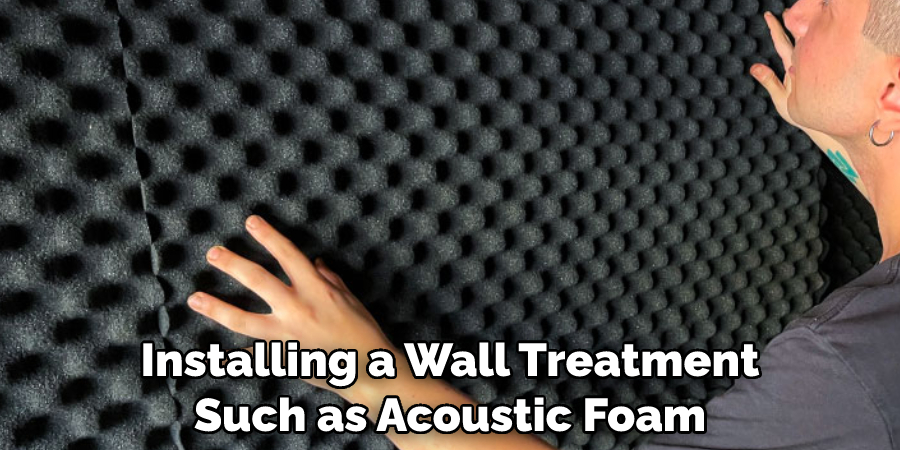
6. Sealing Doors and Windows
Seal the doors and windows in your bathroom with construction adhesive or caulk to further reduce sound leakage. This will also help keep any sounds from escaping the room, which is especially important if you live in an area with a lot of traffic noise outside.
7. Filling Joints
Use a caulk gun to fill in any joints or gaps around the door and window frames. This will help ensure that no sound can escape through the cracks. It is an essential step when soundproofing the bathroom.
8. Installing a Fan
Installing an exhaust fan in your bathroom is also a great way to reduce echoes and improve sound quality. It will help vent out any excess moisture from the room and keep it smelling fresh while also helping muffle noises from escaping outside of the house.
9. Applying Soundproof Paint
You can also apply soundproof paint to the walls of your bathroom to help reduce exterior noise and improve overall sound quality. This will provide an extra layer of protection from outside noises and make it easier for you to relax in peace.
10. Installing a Door Sweep
Finally, install a door sweep to the bottom of the bathroom door to prevent any sound from entering or leaving the room. This will help you keep your privacy and make sure that no one can hear what’s happening in the bathroom when it’s closed.
Once you have followed all of these steps, your bathroom will be much more soundproof, and you can enjoy some much needed peace and quiet! With a little bit of effort, your bathroom can be the perfect place to relax after a long day.
8 Safety Precautions to Follow
When attempting to soundproof your bathroom, it is important that you take all necessary safety precautions. Failure to do so can result in electrical shock or fire hazards. Before beginning any project, make sure you have the proper licenses and/or permits from local authorities as applicable. Follow these tips for a safe soundproofing project:
1. Make sure you are using the right materials for your project. If insulation is needed, only use fireproof and non-toxic options. The right tools will also ensure that the project is done safely.
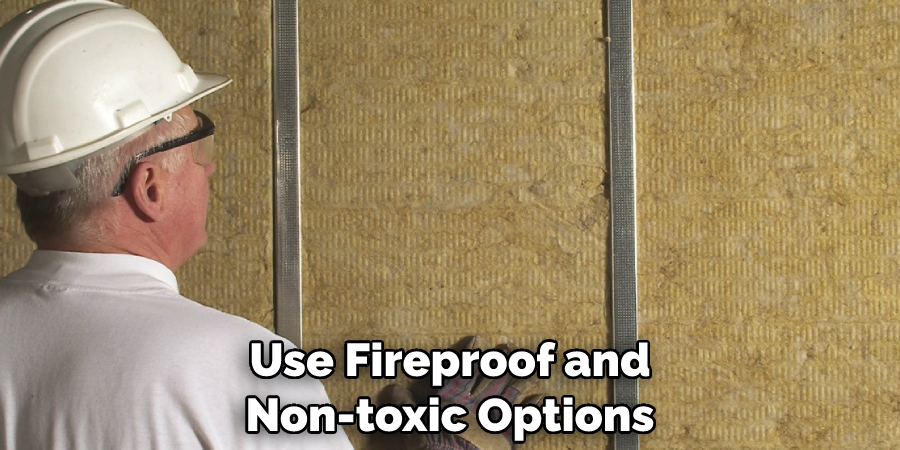
2. Wear protective gear such as goggles, gloves, and dust masks to prevent dust from entering your lungs and eyes. The protective wear will also guard you against any sharp objects while working.
3. Turn off the power to the bathroom before beginning construction or installation of soundproofing materials. This will prevent accidents such as electric shocks or fire hazards.
4. Follow safety instructions and guidelines for all tools used during the project, including ladders, hammers, saws, etc.
5. Check the ventilation of your space to ensure that it is adequate and free from any blockages or obstructions. Proper ventilation will help keep harmful fumes out of the room and prevent asphyxiation.
6. Do not use staple guns when working with acoustic foam or other soundproofing materials – this will damage the material and reduce its effectiveness. Instead, use screws or nails to attach materials.
7. If gluing is required during installation, use adhesive specifically made for soundproofing projects and avoid any flammable adhesives. It will protect your safety and the longevity of the soundproofing materials.
8. When working with drywall, always make sure to use a safe method for cutting or sawing through it to avoid injury or damage to walls or ceilings. Maintain a safe work environment by keeping the workspace clean and organized.

How Much Will It Cost?
The cost of making your bathroom soundproof will depend on the materials and methods you choose to use. You may need to buy acoustic foam, insulation, sealants, or other products depending on what your project requires. Many of these items can be bought online or in home improvement stores for a relatively low cost.
It is important to factor in the cost of any installation labor you may need as well. Many of these soundproofing methods require specialized tools and knowledge, so hiring a professional can be worth it in the long run. Therefore, the exact cost to make your bathroom soundproof will depend on what materials and services you choose to use.
Conclusion
Making your bathroom soundproof is not a task that should be taken lightly. It may take some time and effort to make sure that your bathroom is really soundproofed, but with the right materials, it is well worth the effort. Taking the necessary steps on how to make bathroom soundproof to ensure that your bathroom is properly soundproofed can help protect your privacy and serve as an effective way of controlling unwanted noises coming from inside or outside of your home.
Plus, when completed correctly, soundproofing can create a truly peaceful space inside what previously may have been an echoing chamber. No matter which soundproofing materials you use in creating this haven of peace, you can rest assured knowing that you’re making an investment in self-care that will last for years.
So now it’s time to turn off that pesky radio and settle into the quiet sanctuary of a perfectly insulated bathroom space – courtesy of your own creative problem-solving!

